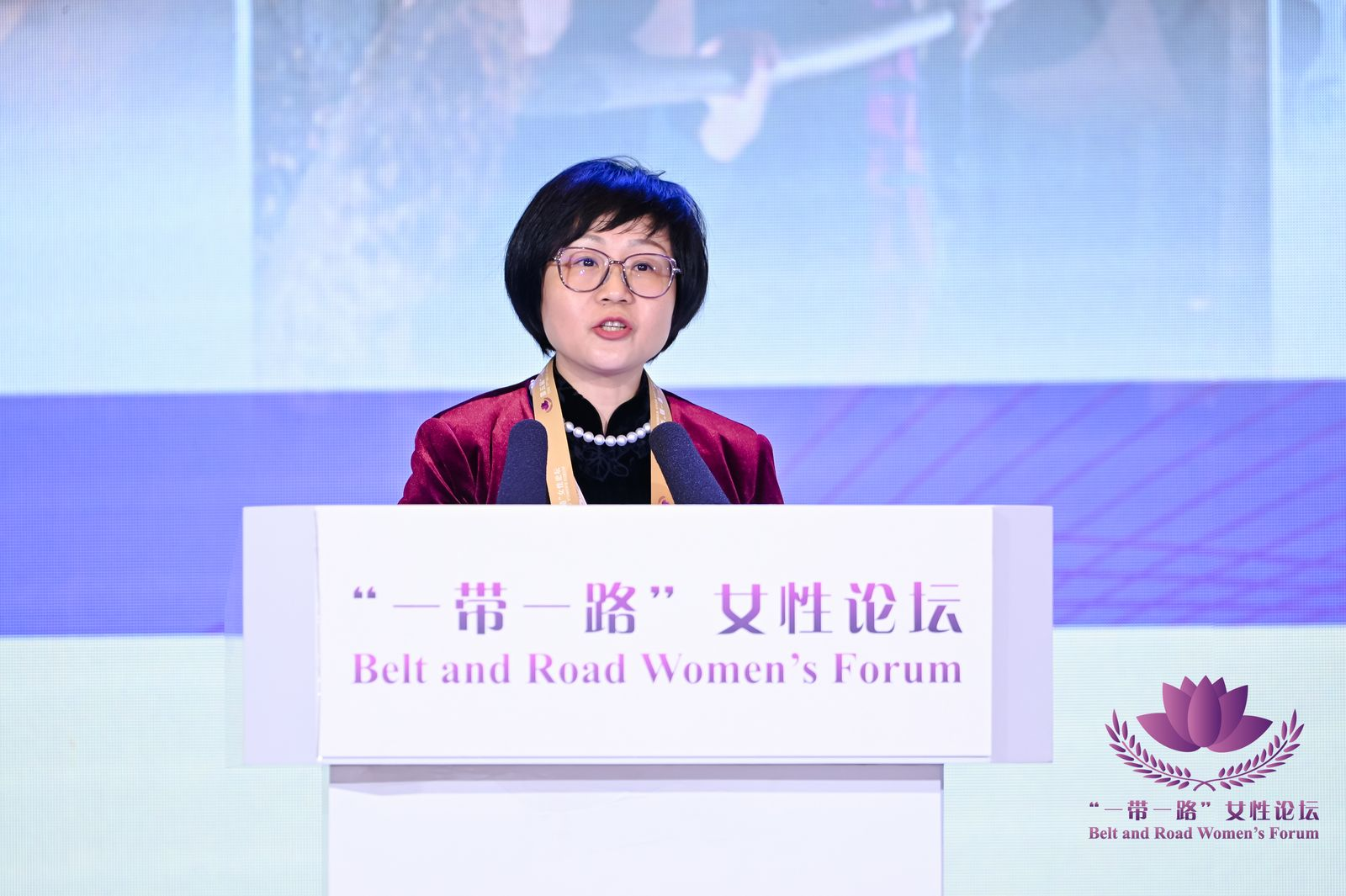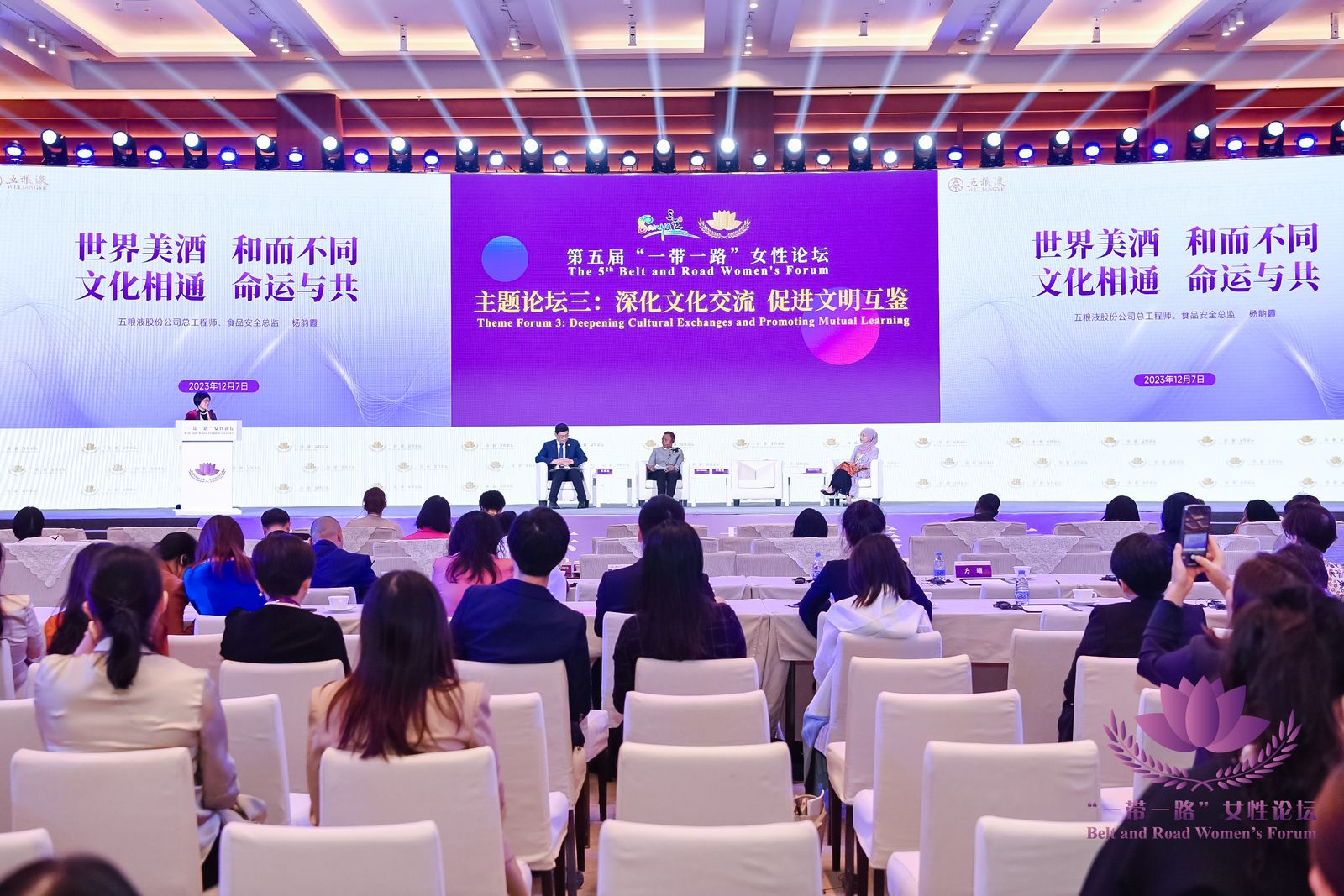Yang Yunxia, Chief Engineer of Wuliangye Yibin Co., Ltd., attended the forum and delivered a speech
date:2023-12-22 11:09:34 hits:
The 5th Belt and Road Women’s Forum successfully convened in Sanya, Hainan from December 6-8. Co-hosted by the Chinese People’s Association for Friendship with Foreign Countries, the All-China Federation of Returned Overseas Chinese, and the UN Resident Coordinator Office in China, and jointly organized by the People’s Government of Sanya City, the China Friendship Foundation for Peace and Development, and the Secretariat of the Belt and Road Women’s Forum. Yang Yunxia, Chief Engineer of Wuliangye Yibin Co., Ltd., attended the forum and delivered a speech.

Respected hosts, ladies and gentlemen, and friends, good afternoon!
It is a great honor to represent Wuliangye at today’s forum. My speech, titled ‘World Fine Wines: Diversity in Harmony, Cultural Exchange, and Shared Destiny,’ focuses on the theme of ‘Deepening Cultural Exchanges and Promoting Mutual Learning.’
Wine, as one of the world’s oldest beverages, has accompanied and witnessed the footsteps of human civilization. The profundity of wine culture stems from its essence drawn from various ethnic cultures. The development of wine has led to different brewing materials, environments, and techniques due to regional conditions, and different national characteristics have created diverse drinking rituals and ethics. The combination of national temperament and natural ecology has nurtured distinct wine cultures. Humanity and wine have always been intricately linked, empathetically connected, and harmoniously united.
In China, brewing technology can be traced back to the Jiahu culture 9,000 years ago. Over the ages, China’s abundant ecological resources and the philosophy of ‘human beings are an integral part of nature and should follow the laws of nature’ have endowed Chinese wine culture with unique charm. As one of the world’s six major distilled spirits, Chinese Baijiu has the earliest history, longest fermentation cycle, most complex process, largest production volume, and is unique to China, representing Chinese wine culture.
Baijiu has numerous varieties, with 12 main types of flavor. The mainstream types include the Luzhou-fla vor liquors represented by Wuliangye, Yanghe, and Luzhou Laojiao; the Maotai-flavor liquors represented by Maotai and Langjiu; and the Fen-flavor liquors represented by Fenjiu.
As a typical representative of Chinese Luzhou-flavor liquors Baijiu, Wuliangye, with a history spanning over a millennium, first brewed in the Tang Dynasty, flourishing in the Song, refined in the Yuan, established in the Ming, and named in the Qing Dynasty. It was the first in the world to use five types of grains for brewing. As part of Chinese Baijiu culture, Wuliangye embodies a ‘harmonious beauty culture,’ integrating ecological views, pursuit of excellence, and craftsmanship in its high-quality development. ‘Harmonious Wuliangye’ stems from its value orientation in ecology, continuous cultural stance, and group identity spirit: born in Yibin, a region blessed by nature and defined by UNESCO and FAO as ‘the best area on the same latitude for brewing high-quality pure distilled Baijiu’; owning the largest, oldest continuously used cellar-style Qu fermentation pits for 655 years, the soul of Wuliangye’s harmonious life; the ‘Secrets of the five words’ craftsmanship, winning the ‘National Famous Liquor’ title four times, the spirit of Wuliangye’s harmonious production; over 3,000 flavor compounds coexisting in harmony, its unique and balanced genetic makeup, the essence of Wuliangye’s harmonious vitality; a rich product range meeting consumers’ aspirations for a better life, the expression of Wuliangye’s harmonious living.
Today, amid the trend of Chinese and world wine cultures merging, Wuliangye looks forward to sharing ‘harmonious beauty culture’ with more friends, hoping to form a harmonious pattern of different wines from around the world, each unique yet diverse, built, and shared. We aim to create an ideal world where people of different nations, countries, and regions toast to joy, sing with wine, thrive with wine, convey philosophies with wine; and realize a vision of wine cultures exchanging, connecting, and mutually learning.
Ladies and gentlemen, and friends, wine symbolizes water’s form and fire’s passion. In Chinese culture, it represents the unity of Yin and Yang. We often say, ‘Women are like water.’ The beauty of women not only symbolizes the form of wine but also plays a special and significant role in wine culture and industry.
I look forward to the day when we can join hands with friends from different countries and regions, especially our female friends and male friends present today, including our host, to promote the spirit of the Silk Road through wine, deepen international cooperation under the Belt and Road Initiative, and make new and greater contributions to building a shared human destiny. Thank you!

The theme of the forum, ‘She Power: Jointly Building and Sharing a Beautiful Life,’ reflects a focus on women’s unique contributions and empowerment within the context of the Belt and Road Initiative. Organized by the Chinese People’s Association for Friendship with Foreign Countries, the All-China Federation of Returned Overseas Chinese, and the All-China Youth Federation, along with the People’s Government of Sanya City leadership, the forum brought together over 400 participants. These included the First Lady of Guyana, representatives from the United Nations, Nobel laureates in Physiology or Medicine, and ambassadors from Kyrgyzstan, Zambia, Maldives, Switzerland, Nepal, Guyana, Uganda, Mozambique, and various other countries, along with national and international business representatives.
During the forum, in-depth discussions and exchanges took place around the theme. Guests shared insights on the distinctive role played by women in the ten years since the Belt and Road Initiative was launched. They highlighted the substantial achievements of women and looked forward to the future of the initiative, advocating for women’s empowerment to foster common development and prosperity in human society.
2023 marks the tenth anniversary of the Belt and Road Initiative. Over the past decade, the Belt and Road Women’s Forum has been instrumental in showcasing the unique role of women in the development of the Belt and Road Initiative, promoting comprehensive and sustainable development for women, and enhancing people-to-people connections among the participating countries. The forum has successfully established a platform for communication and collaboration among women across the Belt and Road countries, building bridges for mutual understanding and cooperation.

Respected hosts, ladies and gentlemen, and friends, good afternoon!
It is a great honor to represent Wuliangye at today’s forum. My speech, titled ‘World Fine Wines: Diversity in Harmony, Cultural Exchange, and Shared Destiny,’ focuses on the theme of ‘Deepening Cultural Exchanges and Promoting Mutual Learning.’
Wine, as one of the world’s oldest beverages, has accompanied and witnessed the footsteps of human civilization. The profundity of wine culture stems from its essence drawn from various ethnic cultures. The development of wine has led to different brewing materials, environments, and techniques due to regional conditions, and different national characteristics have created diverse drinking rituals and ethics. The combination of national temperament and natural ecology has nurtured distinct wine cultures. Humanity and wine have always been intricately linked, empathetically connected, and harmoniously united.
In China, brewing technology can be traced back to the Jiahu culture 9,000 years ago. Over the ages, China’s abundant ecological resources and the philosophy of ‘human beings are an integral part of nature and should follow the laws of nature’ have endowed Chinese wine culture with unique charm. As one of the world’s six major distilled spirits, Chinese Baijiu has the earliest history, longest fermentation cycle, most complex process, largest production volume, and is unique to China, representing Chinese wine culture.
Baijiu has numerous varieties, with 12 main types of flavor. The mainstream types include the Luzhou-fla vor liquors represented by Wuliangye, Yanghe, and Luzhou Laojiao; the Maotai-flavor liquors represented by Maotai and Langjiu; and the Fen-flavor liquors represented by Fenjiu.
As a typical representative of Chinese Luzhou-flavor liquors Baijiu, Wuliangye, with a history spanning over a millennium, first brewed in the Tang Dynasty, flourishing in the Song, refined in the Yuan, established in the Ming, and named in the Qing Dynasty. It was the first in the world to use five types of grains for brewing. As part of Chinese Baijiu culture, Wuliangye embodies a ‘harmonious beauty culture,’ integrating ecological views, pursuit of excellence, and craftsmanship in its high-quality development. ‘Harmonious Wuliangye’ stems from its value orientation in ecology, continuous cultural stance, and group identity spirit: born in Yibin, a region blessed by nature and defined by UNESCO and FAO as ‘the best area on the same latitude for brewing high-quality pure distilled Baijiu’; owning the largest, oldest continuously used cellar-style Qu fermentation pits for 655 years, the soul of Wuliangye’s harmonious life; the ‘Secrets of the five words’ craftsmanship, winning the ‘National Famous Liquor’ title four times, the spirit of Wuliangye’s harmonious production; over 3,000 flavor compounds coexisting in harmony, its unique and balanced genetic makeup, the essence of Wuliangye’s harmonious vitality; a rich product range meeting consumers’ aspirations for a better life, the expression of Wuliangye’s harmonious living.
Today, amid the trend of Chinese and world wine cultures merging, Wuliangye looks forward to sharing ‘harmonious beauty culture’ with more friends, hoping to form a harmonious pattern of different wines from around the world, each unique yet diverse, built, and shared. We aim to create an ideal world where people of different nations, countries, and regions toast to joy, sing with wine, thrive with wine, convey philosophies with wine; and realize a vision of wine cultures exchanging, connecting, and mutually learning.
Ladies and gentlemen, and friends, wine symbolizes water’s form and fire’s passion. In Chinese culture, it represents the unity of Yin and Yang. We often say, ‘Women are like water.’ The beauty of women not only symbolizes the form of wine but also plays a special and significant role in wine culture and industry.
I look forward to the day when we can join hands with friends from different countries and regions, especially our female friends and male friends present today, including our host, to promote the spirit of the Silk Road through wine, deepen international cooperation under the Belt and Road Initiative, and make new and greater contributions to building a shared human destiny. Thank you!

The theme of the forum, ‘She Power: Jointly Building and Sharing a Beautiful Life,’ reflects a focus on women’s unique contributions and empowerment within the context of the Belt and Road Initiative. Organized by the Chinese People’s Association for Friendship with Foreign Countries, the All-China Federation of Returned Overseas Chinese, and the All-China Youth Federation, along with the People’s Government of Sanya City leadership, the forum brought together over 400 participants. These included the First Lady of Guyana, representatives from the United Nations, Nobel laureates in Physiology or Medicine, and ambassadors from Kyrgyzstan, Zambia, Maldives, Switzerland, Nepal, Guyana, Uganda, Mozambique, and various other countries, along with national and international business representatives.
During the forum, in-depth discussions and exchanges took place around the theme. Guests shared insights on the distinctive role played by women in the ten years since the Belt and Road Initiative was launched. They highlighted the substantial achievements of women and looked forward to the future of the initiative, advocating for women’s empowerment to foster common development and prosperity in human society.
2023 marks the tenth anniversary of the Belt and Road Initiative. Over the past decade, the Belt and Road Women’s Forum has been instrumental in showcasing the unique role of women in the development of the Belt and Road Initiative, promoting comprehensive and sustainable development for women, and enhancing people-to-people connections among the participating countries. The forum has successfully established a platform for communication and collaboration among women across the Belt and Road countries, building bridges for mutual understanding and cooperation.
